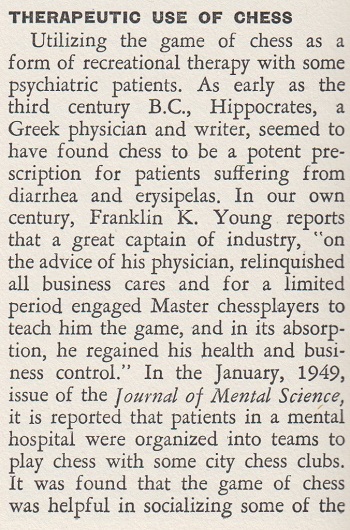
Edward Winter

CHESS, December 1950, page 56
Three confusing quotes:
Source: Chess Quotations from the Masters by H. Hunvald (Mount Vernon, 1972), page 5.
Source: CHESS, June 1984, page 21. See also pages 62-63 of The Genealogy of Chess by D.H. Li (Bethesda, 1998) and pages 49-50 of The Personality of Chess by I.A. Horowitz and P.L. Rothenberg (New York, 1963).
Source: Wonders and Curiosities of Chess by I. Chernev (New York, 1974), page 177.
(4005)
Mark N. Taylor (Mt Berry, GA, USA) writes:
‘I can offer a clarification of the Confucius “pre-chess” chess quote. James Legge’s translation in Book XVII Chapter XXII on page 329 of Confucian Analects (1893 edition, reprinted by Dover Publications, Inc., New York in 1971) reads:
“The Master said, ‘Hard is it to deal with him, who will stuff himself with food the whole day, without applying his mind to anything good! Are there not gamesters and chessplayers? To be one of these would still be better than doing nothing at all.”
Legge admits in a note that “gamesters” (bo – to use the Pinyin transliteration) is a best guess. He also notes that both Chinese Chess and Go can be referred to here with the single term i.
On pages 215-216 of The Analects of Confucius (1938 edition, reprinted by Vintage Books, New York in 1989) the translator Arthur Waley put:
“Are there not games such as draughts? To play them would surely be better than doing nothing at all.”
Waley took both bo and i to refer to playing board games and suggested that i could be identified with Go. The character i is a verb, meaning “ to play a board game”, without necessarily specifying which. Thus the term chess in this passage has been interpolated by the translators.’
(4013)
C.N. 4005, an item entitled ‘Pre-chess chess quotes’, gave the following from page 5 of Chess Quotations from the Masters by H. Hunvald (Mount Vernon, 1972):
‘When you are lonely, when you feel yourself an alien in the world, play chess. This will raise your spirits and be your counselor in war. – Aristotle.’
Michael Clapham (Ipswich, England) draws attention to this passage on page 219 of A History of Chess by H.J.R. Murray (Oxford, 1913):
‘From the time of al-Ma’mūn onwards, the writings of the more famous Greek philosophers became known to the Muslim world in translation. It was, perhaps, inevitable that the scattered allusions to the Greek board-games which occur in Plato and other writers should be misapplied to chess, but to this we owe the statements in H and later chess books that Aristotle, Galen and Hippocrates were also chessplayers.’
Page 175 gave the meaning of ‘H’: ‘MS John Rylands Library, Manchester, Arab. 59.’
A further extract from Murray’s book (page 164):
‘Greek literature and tradition are alike silent as to the existence or otherwise of these works and theories, and when we turn to the Arabic chess MSS which are based upon the works of al-‘Adlī and aṣ-Ṣūlī, we find the only references to Greek chess relate to the philosophers Hippocrates and Galen, and to Aristotle.’
(5655)
The June 1956 issue of Playboy had a section entitled ‘Chess – a compendium’:

Al Horowitz’s ‘A Short, Happy History of Chess’ contained such material as the following (page 51):
‘One would hardly suppose that there could be so much connection between chess and sex, and yet both legend and historic record show some extraordinary twists and turns in this respect. There is an amusing yarn, for example, about the siege of Troy, according to which the Greek chieftains whiled away the time in a chess tournament. Briseis, a tasty female slave, was to be the prize. Achilles and Agamemnon became the finalists, and Achilles lost both the tournament and the girl when his crafty rival plied him with wine. Small wonder that the mighty warrior afterward sulked in his tent.’
(5233)
Another pre-chess chess quote, in a reference to Hippocrates, comes from the entry on the ‘therapeutic use of chess’ on pages 204-205 of Dictionary of Modern Chess by Byrne J. Horton (New York, 1959):


(10736)
‘If we were to accept the statements of translators we should believe that Adam and Eve, Solomon, the ancient Egyptians, Greeks and Romans, the inhabitants of America before the time of Columbus, all played chess. When a translator finds a game mentioned in the text he is translating, he naturally replaces its name by the name of a game which is familiar to his readers and which enjoys a like reputation. The serious historian has to go behind the translation to the original texts.’
Source: a letter from H.J.R. Murray headed ‘Chess in Ireland’ on pages 503-504 of the December 1933 BCM.
(11227)
To the Chess Notes main page.
To the Archives for other feature articles.
Copyright: Edward Winter. All rights reserved.